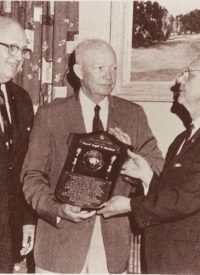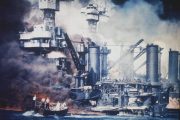
Papers released to the public on December 10 by the Eisenhower Presidential Library appear to show that as America’s 34th President prepared his farewell address to the nation, he toyed with several options before coming up with the term “military-industrial complex” to describe his supposed fears of a highly placed network of powerful groups and individuals driving the nation’s foreign policy.
The previously unseen papers came in the form of drafts of Mr. Eisenhower’s farewell speech found among other papers at a northern Minnesota cabin owned by Malcolm Moos, former University of Minnesota president and one-time speech writer for Mr. Eisenhower. Moos’ son discovered the papers, covered with pine cones and other debris at the remote cabin, and turned them over to the Eisenhower library in October.
“We are just so fortunate that these papers were discovered,” said Karl Weissenbach, director of the library. “We were finally able to fill in the gaps of the address. For a number of years it was apparent that there were gaps.”
In part, the papers appear to show the evolution of the term “military-industrial complex” coined by the President and used for years afterward in foreign policy debate. During the nearly two years it took the president, chief speech writer Moos, and even Mr. Eisenhower’s brother, Milton, to hammer out the text of the speech, the now-historic term evolved from “war-based industrial complex,” to “vast military-industrial complex,” and finally to simply “military-industrial complex.”
In the final version of the speech, President Eisenhower said that the nation could no longer rely on “emergency improvisation of national defense” as it had during World War II, noting that a permanent arms industry was vital to the nation’s security. Nonetheless, he warned, there would be “grave implications” to the conjoining of military and industrial power against which the American people would have to stand firm. “In the councils of government, we must guard against the acquisition of unwarranted influence, whether sought or unsought, by the military-industrial complex,” declared Mr. Eisenhower. “The potential for the disastrous rise of misplaced power exists and will persist. We must never let the weight of this combination endanger our liberties or democratic processes.”
Weissenbach called the speech “probably the most important farewell address of the modern era,” adding that “now we get to see its evolution, which started in May 1959 and didn’t end until it was delivered. We also learn the important role of Milton Eisenhower, who was instrumental in making sure that his brother’s thoughts would be correctly portrayed.”
The recently discovered papers reveal that the President’s farewell address began 20 months before its delivery as reflections on Mr. Eisenhower’s years of service and the role of the military, gradually expanding into observations on the rapid advance of technology, with Mr. Eisenhower reflecting that while he wasn’t able to move the world significantly closer to world peace, he had at least done his part to avert nuclear war.
Among the papers were 21 drafts showing the speech’s evolution over the nearly two years of preparation, and revealing the extent of the involvement of Milton Eisenhower, whom the President considered an important part of his inner circle of advisers. Notations by the President’s brother were present throughout the drafts, with major revisions by him appearing just ten days before the Mr. Eisenhower delivered the speech. “That to me illustrates how Milton had a take-charge moment where he wasn’t pleased with the direction it was taking and made an overhaul,” said Weissenbach. “Obviously he wouldn’t have done it without the blessing of his brother.”
While in his farewell address President Eisenhower made a splendid show of his supposed concern about the increase of power in the hands of a few highly placed individuals and groups, it has been well documented that as Supreme Allied Commander in Europe during World War II, and later as Military Governor of the U.S. Occupation Zone after the war, Mr. Eisenhower was as responsible as anyone for allowing the Soviet Union to gain unchallenged domination in eastern Europe.
In fact, in his privately published report entitled The Politician, John Birch Society Founder Robert Welch documented how Mr. Eisenhower, both as a military commander and as President, had — either intentionally or unintentionally — dramatically helped advance the cause of communist world domination.
A recent article by the Salt Lake Tribune reveals that even one of Mr. Eisenhower’s own former cabinet members, Secretary of Agriculture Ezra Taft Benson, became convinced that the President had been used to advance the communist cause. The Tribune’s Lee Davidson, writes that in a highly confidential letter to FBI Director J. Edgar Hoover, Benson attempted “to convince Hoover that The John Birch Society was a clear-thinking anti-communist group. So he wrote how it had convinced him that a friend of theirs had been a tool of the worldwide communist conspiracy.”
Related article:



